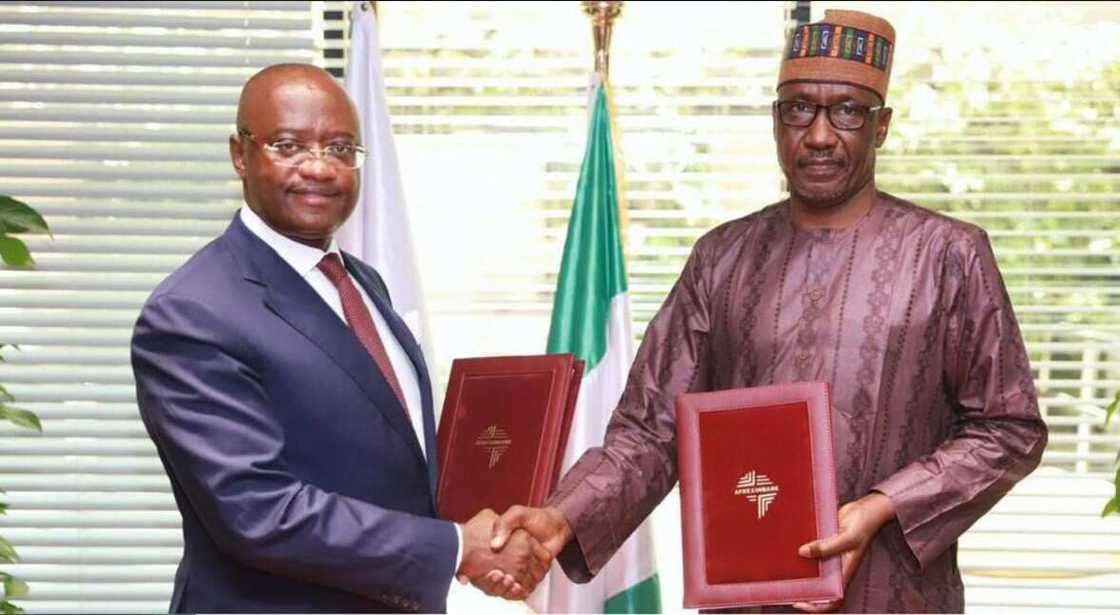NNPC Tells Nigerians to Get Ready for Stronger Naira, Cheap Fuel After Securing $3BN Emergency Loan
- The Nigerian National Petroleum Corporation (NNPC) Limited has secured a $3 billion loan from AfreximBank
- The new loan will help strengthen the naira against the dollar and ultimately reduce the cost of petrol in the country
- NNPC Limited has provided a breakdown explaining that the loan is simply an upfront cash loan against proceeds from future crude oil production
Unlock the best of Legit.ng on Pinterest! Subscribe now and get your daily inspiration!
The Nigerian National Petroleum Corporation (NNPC) Limited has announced that it has successfully secured $3 billion in crude-for-cash funding from the African Export-Import Bank (Afreximbank).
NNPC hopes the loan will support the naira needs to stabilise against the dollar in the foreign exchange market, Punch reports.

Source: Facebook
NNPC Limited, in a statement, said:
“The $3 billion loan will provide some immediate disbursement that will enable the NNPC Ltd to support the Federal Government in its ongoing fiscal and monetary policy reforms aimed at stabilising the exchange rate market”.
PAY ATTENTION: Сheck out news that is picked exactly for YOU ➡️ find the “Recommended for you” block on the home page and enjoy!
At the close of trading on Wednesday, August 17, 202, the naira exchanged against the dollar at N880 on the black market.
While FMDQ securities report that at the official investors and exporters FX window, naira to dollar closed at N759.86 a dollar.
Oil production
Since the new loan is tied to Nigeria's crude oil, the NNPC limited, and the federal government must work hard to boost production levels.
Legit.ng, in a previous report, revealed that Nigeria had lost its position as Africa's biggest oil-producing country because the country's oil production declined by 13.8% to 1.08 million barrels per day (mbpd) in July 2023.
What to know about NNPC's $3bn AfreximBank loan
NNPC Limited has provided a detailed explanation of the crude oil loan
1. What is the $3 billion loan about?
The NNPC Ltd. secured an emergency $3 billion crude oil repayment loan from AFREXIM Bank. This is not a crude-for-refined products swap but an upfront cash loan against proceeds from a limited amount of future crude oil production.
2. Is this loan risky for NNPC Ltd. or the Nigerian Treasury?
No. The exposure for NNPC Ltd. is minimal, covering just a fraction of their entitlements. Additionally, there are no sovereign guarantees tied to this loan.
3. What's the benefit of this loan to Nigeria?
The loan will assist NNPC Ltd. in settling taxes and royalties in advance. It will also equip the Federal Government with the necessary dollar liquidity to stabilise the naira with limited risk.
4. How will the loan be disbursed?
The funds will be released in stages or tranches based on the specific needs and requirements of the Federal Government.
5. Will this affect fuel prices?
A strengthened naira as a result of this initiative will lead to a reduction in fuel costs. If the naira appreciates, the fuel cost will drop, and further increases will be halted.
6. What about subsidies? Are they coming back?
No. A stronger Naira will result in lower prices from the current level, making subsidies unnecessary. The deregulation policy remains unchanged.
7. How will the loan be repaid?
The loan will be repaid against a fraction of proceeds from future crude oil production. It's a strategic move that balances our current economic needs and future production capabilities.
8. What is the difference between this and previous swap deals?
This is not crude for refined products agreement where the government does not earn any proceeds from the swap.
Expert insights
Reacting to the development, Paul Alaje, the Chief Economist at SPM Professionals, explained that the $3 billion loan will impact Nigeria's foreign reserves almost immediately and, most importantly, help stimulate the supply side of the foreign exchange market.
He, however, raised concerns that NNPC only mentioned that the loan would be paid back with crude oil but failed to mention at what price for transparency.
His words:
"The NNPC $3bn loan has both positive and negative. The positive is that it will help CBN defend the naira but the negative is that it is only for the short term.
"The CBN's most recent audited report shows that a lot of money in Nigeria's foreign reserve is the product of loans. Nigeria should not always rely on loans to solve problems because we must pay back.
Nigeria sold N21tn worth of crude oil in 2022, with US and India among biggest customers
Meanwhile, in another report, Legit.ng revealed that Nigeria sold crude oil in 2022 for N21.09 trillion, according to the NBS.
The sales were a 46.41% rise over the N14.41 trillion in sales reported in 2021. NBS included sales in its fourth quarter international trade report, which Legit.ng downloaded from its website.
According to research, Nigeria's N26.79 trillion total exports in 2022 comprised 78.74% of crude oil exports.
Source: Legit.ng


